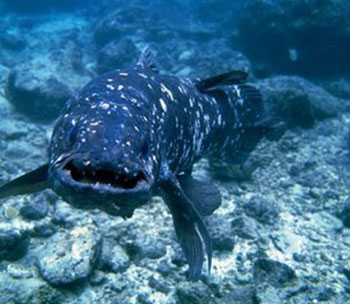Researchers sequenced the genome of the coelacanth: a deep-sea fish that closely resembles its ancestors, which lived at least 300 million years ago.
The study found that some of the animal’s genes evolved very slowly, giving it its primitive appearance.
The work also shed light on how the fish was related to the first land-based animals.
The coelacanth has four large, fleshy fins, which some scientists believe could have been the predecessors of limbs.
It had been suggested that this fish was closely related to early tetrapods – the first creatures to drag themselves out of the ocean, giving rise to life on land.
But the study, published in the journal Nature, suggested that another fish called the lungfish, which also has four limbs, had more genes in common with land-based animals.
The coelacanth can reach up to 2m-long and is found lurking in caves deep beneath the waves.
It was thought to have been extinct for millions of years, until it turned up in a trawlerman’s net off the coast of Africa in 1938.
Its ancient appearance has earned it the title “living fossil” – but it is so elusive, that it has been hard to study.
To find out more, an international team of researchers sequenced the coelacanth’s genome, which contained nearly three billion DNA bases,according to the BBC.
Professor Kerstin Lindblad-Toh, from the University of Uppsala in Sweden and the Broad Institute of MIT and Harvard in the US, said: “What we can see is that while the genome as whole changes, the protein-coding genes – that make the living fish – are much more stable and much more unchanging.
“And if you think about it, this might be correlated to the fact that the coelacanth lives in a rather extreme and stable environment.
“It lives several hundred metres down in the ocean, and it may also be in an environment where it doesn’t have a lot of competitors. So maybe it adapted to that environment a long time ago and it doesn’t have a huge need for change.”
The researchers also used the study to try and solve the long-standing question of whether the first tetrapods were more closely related to the coelacanth or the lungfish.
They compared DNA profiles of both of these fish with modern land-based animals, including mammals, birds and lizards.
“We selected 251 genes that were very similar in all these genomes so we could build this picture of how closely related these species were,” Prof Lindblad-Toh explained.
This study is not the only one attempting to understand the coelacanth.
Since the fish was rediscovered in the 1930s, only a few hundred have ever been found, many of these dead caught up in trawls.
Scientists from the French organisation Andromede Oceanology are working with the Natural History Museum in Paris to attach acoustic tracking devices to the fish in order to study their behavior and capture 3D moving images of their fins as they swim.
R.Sawas

